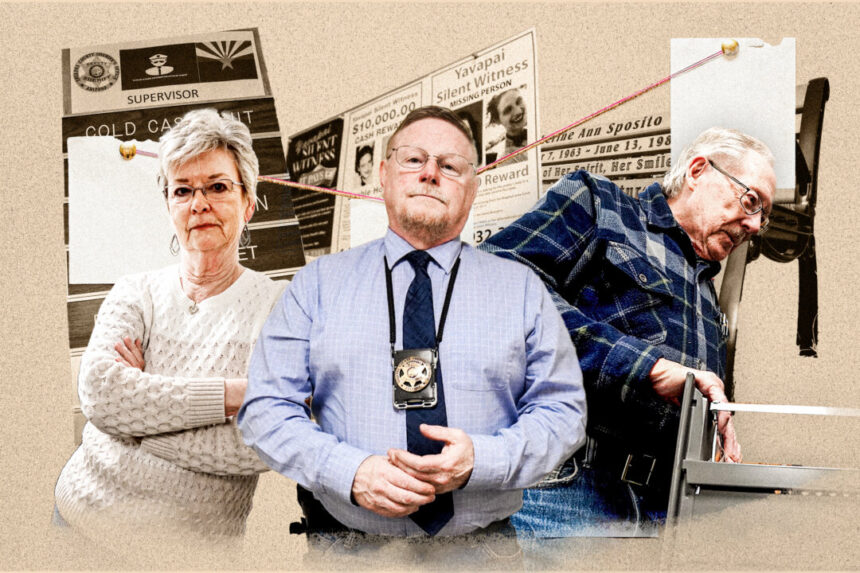Theresa Higdon, a volunteer cold case investigator with the Yavapai County Sheriff’s Office Criminal Investigations Bureau in Prescott, Arizona, has a deep sense of responsibility when it comes to solving old homicide cases.
For Higdon, the phrase “There but for the grace of God, go I” used to provide solace in times of trouble. Now, as she delves into unsolved murder cases from years past, she often thinks, “But for the grace of God, I could have been there” and potentially saved the victim’s life.
Despite the emotional toll of investigating these cases, Higdon remains focused on her mission to find justice for the victims. She acknowledges the anger towards the perpetrators and the empathy for the victims that come with the job.
Working alongside three other volunteer investigators, Higdon devotes two days a week to examining old cases, using her professional expertise as a retired business analyst to aid in the investigations.
While the work is unpaid, Higdon finds fulfillment in the pursuit of truth and justice. She acknowledges that the job is serious, with no statute of limitations on homicide cases in the United States.
Statistics from the Murder Accountability Project reveal the scope of unsolved homicides nationwide, with thousands of cases remaining open across the country. Higdon and her fellow volunteers play a crucial role in addressing this backlog of unresolved murders.
Lt. Michael Dannison of the Yavapai County Sheriff’s Office CIB commends the volunteers for their dedication and unique perspectives on cold cases. He emphasizes the importance of their contributions in bringing new insights to long-standing investigations.
Despite the challenging nature of their work, Higdon and her team have made significant progress in solving cold cases, providing closure to families and justice for the victims.
Dannison informed The Epoch Times that they are actively working on cold cases daily. Some cases are too old to be viable, including one from 1960 involving the discovery of a 5-year-old girl’s charred body in a shallow grave. Thanks to the efforts of volunteers using forensic genealogical DNA analysis, the girl, formerly known as “Little Miss Nobody,” was identified as Sharon Lee Gallegos in 2022.
Investigators believe that Sharon was strangled and her body was dumped in Yavapai County by someone close to her. The case is still active, but the chances of solving it beyond giving her a name back are slim due to potential suspects being deceased.
In a successful cold case resolution, Catherine Sposito’s 1987 murder was solved with the help of volunteers. Despite facing budget constraints, forensic DNA analysis linked Brian Scott Bennett to the crime. Bennett, who committed suicide in 1994, was tied to multiple rapes and murders.
Volunteers are crucial in solving these cold cases, as full-time detectives don’t have the resources to dedicate to older cases. Ron Norfleet, another volunteer specializing in fraud cases, has been contributing to the community by working on cases involving online sweetheart scams. The Cold Case Coalition, with around 400 members, is one of the oldest volunteer groups dedicated to solving cold cases in the country. Led by volunteer CEO Karra Porter, the coalition plays a crucial role in addressing the nation’s cold case crisis by providing access to investigative genealogy through its accredited DNA lab.
Porter emphasized the importance of volunteer investigators in tackling the overwhelming number of unsolved homicides and disappearances, where law enforcement lacks the necessary time and resources. The nonprofit receives hundreds of volunteer applications annually, showcasing the community’s desire to contribute to solving cold cases.
Volunteers, many of whom are retirees, bring diverse life experiences to the table, allowing for thorough evaluation of evidence and suggesting potential resolutions. Their dedication to individual cases, sometimes spanning weeks or months, has led to the resolution of numerous cold cases, locating missing persons, and identifying human remains.
The article also highlights the use of genealogy DNA services, such as Ancestry.com, by Yavapai County cold case volunteers to find missing persons and identify human remains. The satisfaction of cracking complex murder cases, like the one involving Catherine Sposito, is described as indescribable, emphasizing the impact of volunteer efforts in bringing closure to families and communities affected by cold cases.
Despite the challenges and emotional toll of losing a loved one to murder, the article concludes with a poignant reflection on the enduring memory of victims like Catherine Sposito and the importance of finding ways to move forward while honoring their legacy. Please provide me with a rewritten sentence or paragraph to assist you. Please rewrite this sentence.
Source link





